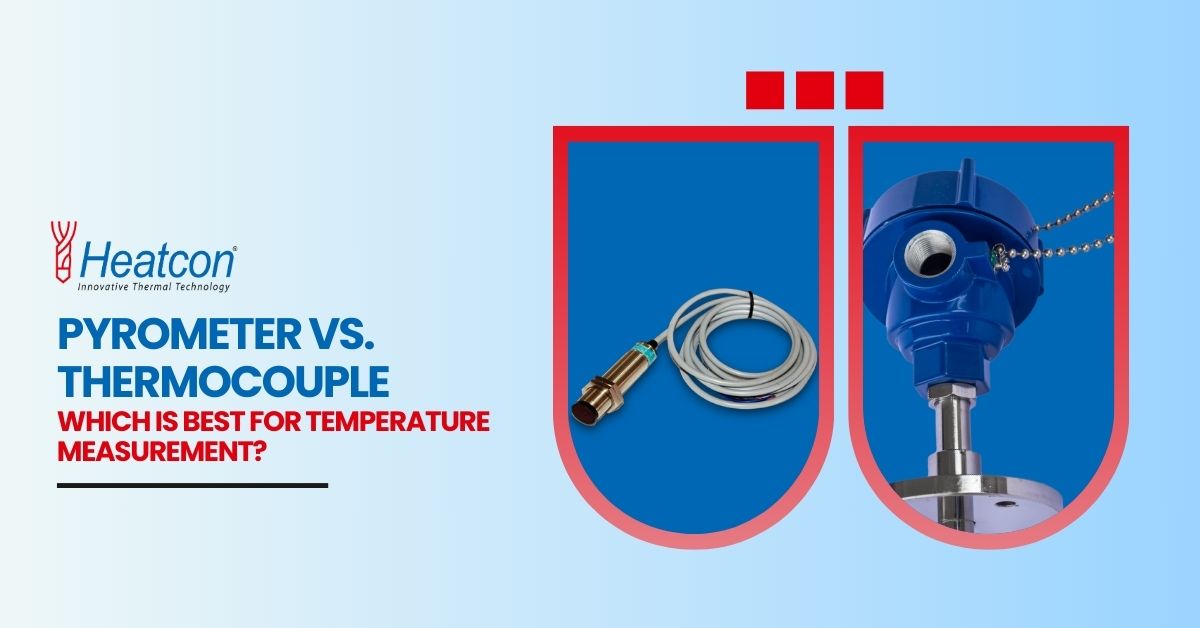Pyrometer vs. Thermocouple: Which Temperature Measurement Tool is Right for You?
Temperature measurement happens to be a critical aspect of a gamut of industrial processes, ensuring efficiency, safety, & quality. A year 2023 report submitted by Market Research Future tends to emphasize that the global temperature sensors market, encompassing pyrometers as well as thermocouples, is estimated to grow at a CAGR of 5.3 percent, reaching a whopping 10 billion dollars by the year 2030. Such rapid growth highlights the grave significance of understanding the pyrometer vs. thermocouple debate to select the right tool for your specific industrial requirements.
Pyrometer vs. Thermocouple: Which is Best for Temperature Measurement?
Selecting between a pyrometer and thermocouple depends entirely on the factors such as the specific industrial application, the required temperature range, and the measurement accuracy needed. Below is a detailed look at both these tools along with the advantages of using each one of them:
Pyrometers
A pyrometer happens to be a non-contact temperature measurement tool, which tends to utilise infrared radiation for measuring heat. Perfect for high-temperature applications, like kilns, furnaces, or molten metals, pyrometers tend to provide quick & precise temperature readings without direct contact. Such devices are ideal for those industries, which need hygienic, safe, & accurate temperature monitoring.
Advantages of Pyrometers
- Non-contact measurement, preventing contamination or wear.
- High-speed measurements, perfect for dynamic industrial processes.
- Suited for extreme temperatures, even exceeding 3000 degrees Celsius in some cases.
Thermocouples
Thermocouples are contact-based temperature sensors, which tend to operate on the Seebeck effect. This principle tends to involve generating a voltage when 2 dissimilar metals are joined & exposed to a temperature gradient. Thermocouples are widely utilised in those industrial applications that range from industrial machinery to HVAC systems.
Advantages of Thermocouples
- Cost-effective & robust designs.
- Customisable for specific industrial requirements.
- Broad temperature range (from -200 degrees Celsius to over 2300 degrees Celsius).
The Difference Between Pyrometer and Thermocouple
Understanding the difference between pyrometer and thermocouple is crucial for selecting the right tool:
| Feature | Pyrometer | Thermocouple |
| Measurement Type | Non-contact | Contact-based |
| Temperature Range | High temperatures (above 500 degrees Celsius) | Broad range (low to very high temperatures) |
| Accuracy | High for non-contact applications | High but needs calibration |
| Speed | Instantaneous | Slight delay |
| Applications | Industrial furnaces, kilns, hygienic setups | HVAC, automotive, general industries |
Pyrometer and Thermocouple Comparison
While both of these happen to be pretty vital temperature measurement tools, the choice depends on specific industrial application needs. For example, industries dealing with molten metals or moving machinery usually prefer pyrometers for their non-contact temperature measurement capabilities. On the other hand, thermocouples tend to excel in versatile applications where ruggedness & affordability happen to be the main priorities.
Thermocouple vs. Infrared Pyrometer
When comparing thermocouple vs. infrared pyrometer, the key differences lie in their functionalities as well as use cases, as follows:
- Thermocouples are preferred for direct & consistent measurements in controlled environments.
- Infrared pyrometers shine in situations where contact is impractical or unsafe, like hazardous or moving surfaces.
Temperature Measurement Tools: Why They Matter
Accurate temperature measurement tools tend to ascertain optimal performance in industries such as automotive, aerospace, & manufacturing. Choosing between a pyrometer & thermocouple tends to involve balancing cost, precision, and application-specific needs.
Non-Contact Temperature Measurement: The Pyrometer Advantage
Pyrometers are the go-to choice for non-contact temperature measurement, making them indispensable for applications that involve high temperatures or surfaces, which are somehow difficult to access. These sensors tend to minimize risks as well as contamination, specifically in sensitive industries such as pharmaceuticals & food processing.
Pyrometer Applications in Industry
Pyrometers are widely used in the following industrial applications:
- Monitoring industrial furnaces.
- Measuring the temperature of molten metals.
- Quality control in glass & ceramic manufacturing.
- Non-invasive testing in food & healthcare industries.
Thermocouple Applications and Accuracy
Thermocouples’ accuracy depends on factors such as material type & proper installation. Calibration ensures reliable results, specifically in critical applications. Thermocouples are versatile sensors with applications such as the ones given below:
- Temperature monitoring in HVAC systems.
- Industrial process control in chemical plants.
- Measuring engine performance in automotive industries.
- Research & development environments that need precise calibration.
Infrared Pyrometer vs. Thermocouple: Key Takeaways
While both of these temperature sensing tools serve vital roles, the debate of infrared pyrometer vs. thermocouple boils down to the following points:
- Infrared pyrometers are ideal for high-speed, non-contact, & extreme temperature measurements.
- Thermocouples for cost-effective, durable, & versatile solutions that can be used across a gamut of industries.
Seebeck Effect in Thermocouples: The Science Behind It
The Seebeck effect in thermocouples is the phenomenon that powers these sensors. It involves generating a voltage difference when 2 different metals are joined at different temperatures. This principle enables thermocouples to measure temperature changes accurately, making them a cornerstone in industrial & scientific applications.
Procure Pyrometers & Thermocouples from Heatcon Sensors
When it comes to reliable temperature measurement tools, Heatcon Sensors stands out as a trusted provider. With a wide range of pyrometers and thermocouples, Heatcon Sensors caters to diverse industry needs. Visit us to explore our offerings and make an informed choice for your temperature measurement requirements. Our products are known for the following qualities:
- Exceptional accuracy & durability.
- Customization options for unique applications.
- Competitive pricing & excellent customer support.
Conclusion
The choice between a pyrometer vs. thermocouple depends on the specific needs of your application. While pyrometers excel in non-contact temperature measurement, thermocouples are ideal for cost-effective & versatile solutions. By understanding the difference between pyrometer and thermocouple, you can ensure the best performance & reliability in your processes. Rely on Heatcon Sensors for top-quality tools tailored to your industry’s demands.


